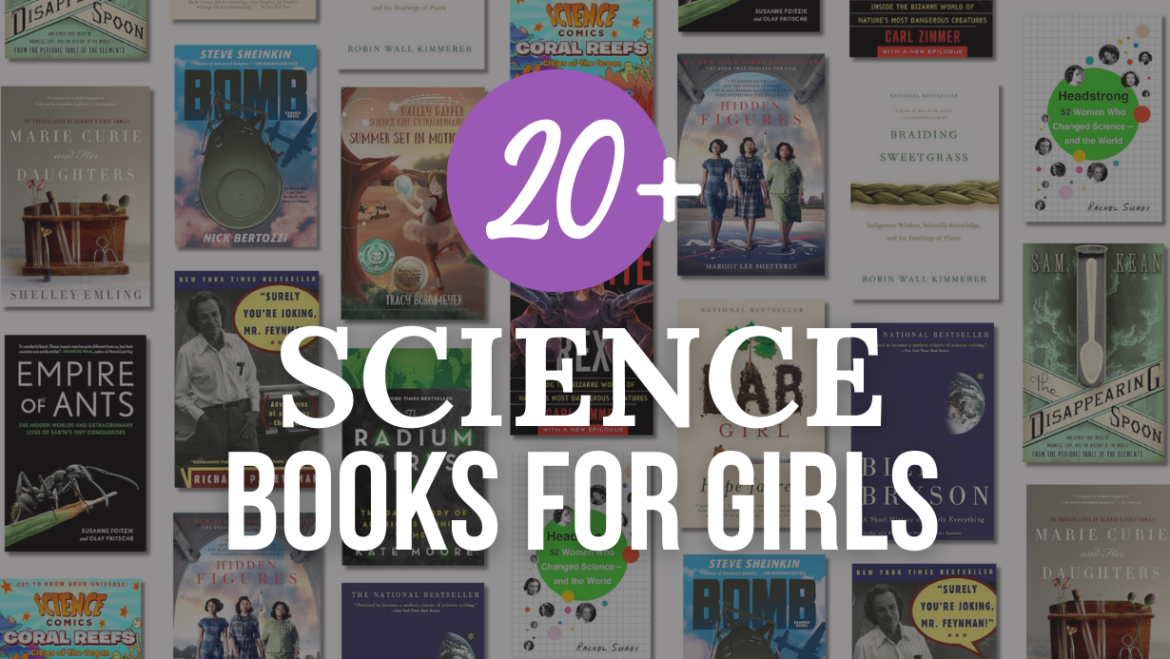Looking for science books for your daughter? Want to encourage critical thinking and thinking like a scientist? If so, let’s look at some recommendations from middle school science teachers. I’ll also add a few of my own selections from what I read with my daughter and, looking back, what I might add to the list.
What Is Critical Thinking?
One of my favorite authors is Louis L’Amour. He says in my favorite book of his, The Walking Drum:
“You are your own best teacher. My advice is to question all things. Seek for answers, and when you find what seems to be an answer, question that, too.”
Critical thinking is quite important, and this isn’t a bad way to think of it. Critical thinking is…
- a set of skills and habits of mind,
- a way to define a problem, identify assumptions, and analyze ideas
- also an approach to reasoning in a critical manner
- listing different possible causes
- creating plausible solutions
- evaluating the correctness of each using logical reasoning.
- the ability to make creative connections between ideas from different disciplines (source)
Here is a great explanation of how to think like a scientist:
Kindling a Love of Reading
“Open a book, and you’ll never know where you end up.” It paraphrases a quote I read poring through Louis L’Amour’s Western stories. I’d stop at the library and pick up a “two-week” bag of books. In a few days, I’d return them all, finished. Every library I walked into was my church, every bookshelf, a pew. To pass on my love of reading, I would read to my daughter when she was younger. Years have passed, and we’re now both avid readers. Reading with your child is one of the best ways to grow a love of reading! My favorites to read to her at the time were a series of Did You Know? children’s books. Today, you can find a wide variety of Did You Know? science books online. Here are a few to explore:
Books that Use Science to Solve Problems
Introduce your daughter to Halley Harper, Science Girl Extraordinaire series of books. These five books feature a nine year old girl who uses science to solve problems. Topics range from the Laws of Motion to chemistry, fossils, nature, and outer space.
Science Books for Girls
Let’s look at 20+ nonfiction books to explore on the chemistry and physics shelf. These are primarily for middle and high schoolers. Explore them in more depth using the links provided.
- A Short History of Nearly Everything by Bill Bryson
- Bomb (Graphic Novel): The Race to Build–and Steal–the World’s Most Dangerous Weapon by Steve Sheinkin and Nick Bertozzi
- Braiding Sweetgrass: Indigenous Wisdom, Scientific Knowledge and the Teachings of Plants by Robin Wall Kimmerer
- Empire of Ants: The Hidden Worlds and Extraordinary Lives of Earth’s Tiny Conquerors by Susanne Foitzik (Author), Olaf Fritsche (Author), Ayça Türkoglu (Translator)
- Headstrong: 52 Women Who Changed Science and the World by Rachel Swaby
- Hidden Figures by Margot Lee Shetterly
- Lab Girl Hope Jahren
- Marie Curie and Her Daughters: The Private Lives of Science’s First Family by Shelley Emling
- Parasite Rex: Inside the Bizarre World of Nature’s Most Dangerous Creatures by Carl Zimmer
- The Radium Girls by Kate Moore
- Science Comic series of 28 books by Maris Wicks, MK Reed, and many others
- “Surely You’re Joking, Mr. Feynman!”: Adventures of a Curious Character by Richard P. Feynman
- The Disappearing Spoon by Sam Kean
- The Glass Universe: How the Ladies of the Harvard Observatory Took the Measure of the Stars by Dave Sobel
- The Jazz of Physics by Stephon Alexander
- The Violinists Thumb: And Other Lost Tales of Love, War, and Genius, as Written by Our Genetic Code by Sam Kean
- What Einstein Told His Cook: Kitchen Science Explained by Robert L. Wolke
- What Einstein Told His Cook 2: The Sequel: Further Adventures in Kitchen Science by Robert L. Wolke
- Women in Science: 50 Fearless Pioneers Who Changed the World by Rachel Ignotofsky
- Women in White Coats by Olivia Campbell
- The Science of Science: A Guide to Thinking Like a Scientist by Crystal C. Li
- Think for Yourself: The Ultimate Guide to Critical Thinking in an Age of Information Overload and Misinformation by Andrea Debbink (author) and Aaron Meshon (illustrator)
- How to Think Like a Scientist by Stephen P. Kramer (author), Felicia Bond (illustrator)
Want more titles? Check out this curated list of STEM novels. Additionally, there are many fiction titles worth exploring that will pique interest. One of my favorites, for example, is Reynolds and Reynolds’ Going Places. You can get a taste for the spirit of the book in the video below:
So, what will you start with? I hope you’ve found some science book selections from the list that have piqued your interest and sparked some inspiration. Do you have other books to add? Let us know your favorites in the comments.

